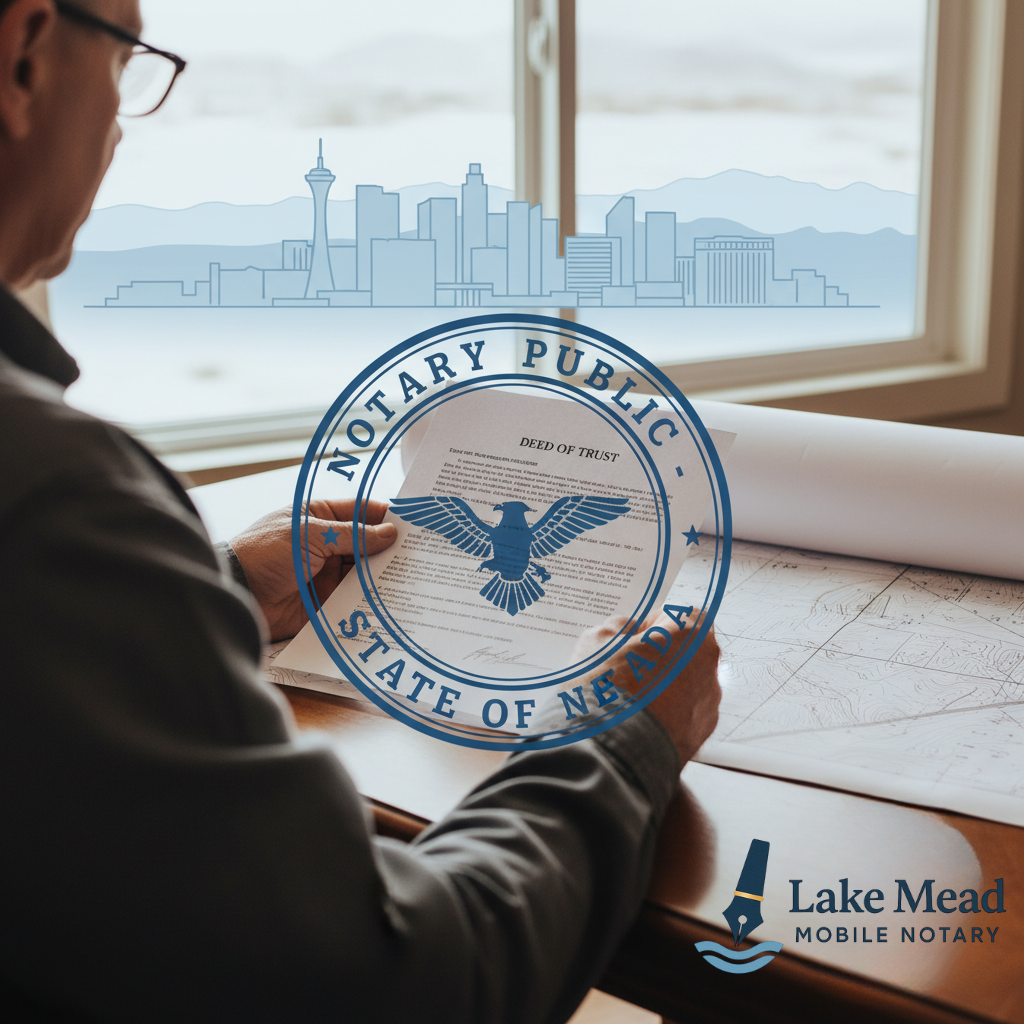
Short answer: in Clark County, the land documents most likely to require notarization are deeds, the Declaration of Homestead, many easement or right of way grants, and sworn supporting affidavits used for recording or title cleanup. Notarization confirms identity and willingness through an acknowledgment, or administers an oath for a jurat when the document is a sworn statement. After notarization, most land documents must be recorded with the Clark County Recorder to be enforceable against third parties. Lake Mead Mobile Notary prepares homeowners, trustees, and authorized agents for clean, recordable documents by verifying names and capacity, choosing the correct Nevada certificate, and keeping margins and venue details compliant. We meet at homes, community clubhouses, and offices across the valley and coordinate spouse or co owner signings. If an authorized representative is signing, we notarize the power of attorney as well. Use this guide to understand which land documents need a notary in Las Vegas and how to avoid common rejections.
A Homeowner’s Guide to Notarizing Land Documents in Las Vegas
Southern Highlands •
Seven Hills •
Silverado Ranch •
The Ridges •
Spring Valley •
Spanish Oaks •
McNeil Estates •
Whitney Ranch
Immediate answer: Deeds, the Declaration of Homestead, many utility easement grants, and sworn affidavits typically require notarization in Nevada. We complete clean certificates and prepare documents so the Clark County Recorder can accept them on first submission.
Which Land Documents Usually Require a Notary in Clark County
Deeds
- Grant Deed, Quitclaim Deed, and Warranty Deed signatures are typically acknowledged.
- Names and capacity must match title and the deed wording.
- Clean Nevada acknowledgment avoids recording delays.
Declaration of Homestead
- Must be signed before a notary and recorded to take effect.
- Uses an acknowledgment, with owner names matching title.
- APN and legal description must be exact and legible.
Easements and Right of Way Grants
- Utility or access easement grants are generally acknowledged.
- Signer capacity must be correct for trusts, LLCs, and POA agents.
- Attach a Nevada compliant loose certificate if preprinted text is not.
Affidavits Supporting Title
- Owner’s affidavit, name variance, marital status, and similar items.
- Require a jurat with oath or affirmation signed in notary’s presence.
- Used to clarify record and support recording or underwriting.
Jurat vs Acknowledgment: Choose the Right Nevada Certificate
Acknowledgment
Used for deeds, easement grants, and homestead declarations. The notary confirms identity and voluntary execution. The signer may have already signed or may sign in front of the notary.
Jurat
Used for sworn statements like owner affidavits. The signer appears, takes an oath or affirmation, and signs in the notary’s presence.
Why it matters
Using the wrong certificate is a common reason for rejection. We attach Nevada compliant loose certificates when the preprinted wording does not fit.
Who Signs: Owners, Trustees, LLC Managers, and Agents
Individual owners and spouses
Names must match title and ID. Spouses on title usually sign the same deed or homestead form with acknowledgments.
Living trusts and estates
The trustee signs in title capacity, presenting a Certificate of Trust if requested. See Trusts and Estate Documents.
LLCs, corporations, and POA agents
The authorized manager or officer signs with capacity evidence. A properly executed Power of Attorney may be used when the titled owner cannot appear.
Witnesses when requested
Some title companies or out of state forms ask for witnesses. We coordinate neutrals. See Notary with Witnesses Provided.
Step by Step for the Most Common Land Documents
Deeds: Grant, Quitclaim, Warranty
- Confirm vesting and legal names exactly as they appear on title.
- Complete grantee details and legal description accurately.
- Appear with valid government ID. We complete a Nevada acknowledgment.
- Record the original deed with the Clark County Recorder.
Declaration of Homestead
- Collect APN and legal description from your deed or title policy.
- Owners on title sign and acknowledge before the notary.
- Submit for recording and retain the stamped copy.
Utility Easement or Right of Way Grant
- Verify the correct signer and capacity, such as trustee or manager.
- Ensure the legal description or easement sketch is attached.
- Notarize with an acknowledgment and record as instructed.
Owner or Title Affidavits
- Prepare the sworn statement that supports title or recording.
- Appear to take an oath or affirmation and sign for a jurat.
- Submit with your main document if required.
Avoid Common Recording Rejections
- Missing or incorrect APN or legal description
- Names on the document do not match ID or vesting
- Incorrect venue or non Nevada compliant certificate wording
- Text outside one inch margins or hard to read printing
We supply Nevada compliant certificates, verify capacity, and check formatting for smooth recording.
What to bring
- Valid ID for every signer
- The completed document with no required blanks
- Trust or corporate capacity papers if applicable
- Recording instructions from your title company if provided
Mobile Notary for Land Documents Across the Valley
Document types we handle
- Grant, Quitclaim, and Warranty Deeds
- Declaration of Homestead
- Utility and access easement grants
- Owner and title affidavits
Transparent Pricing by Document Type
Nevada sets maximum fees per notarized signature. Quotes may include travel, wait time, after hours, and multi signer complexity when applicable.
Related Services You May Need
“Recorded first try.” Clean acknowledgment and margins. — H.K., Seven Hills
“They handled our trust capacity.” Smooth trustee signing. — P.S., The Ridges
“Great coordination for our parents.” At home appointment. — R.N., McNeil Estates
🖊️ Land Document Notarization — Same Day Mobile Service
Deeds, homestead, easements, and supporting affidavits notarized and prepared for recording across Las Vegas and Henderson.
Ready to sign? Get a precise, compliant notarization that records without delays.
